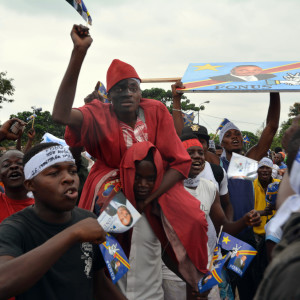Political tensions building for months over President Joseph Kabila’s refusal to allow national elections to pick his successor erupted over the weekend as security forces cracked down on peaceful demonstrators in the Democratic Republic of Congo with blockades, tear gas and gun fire.
The brutal show of force underscored Kabila’s desperate efforts to cling to power despite growing calls from the international community that he abide by a Constitutional term-limit requiring him to step down in December.
And politically, this is a test of American resolve on a continent where US officials hope to foster home-grown democratic movements, as well as where there is an abundance of natural resources that support modern economies, from oil to minerals found in laptops, cell phones, and other consumer goods.
The crackdown came on a day when leaders of the political opposition called for rallies intended to commemorate creation of a multi-party, Democratic system in the DRC, a former Belgian colony that won its independence in 1960.
Reports over the weekend described how the gathering rapidly descended into chaos and violence. As tens of thousands of people gathered around opposition politicians — including Moises Katumbi, the choice of the G-7 opposition bloc to run for president – security forces swept down on them.
Armed and deploying tear gas, the forces arrested opposition leaders, while employing force against demonstrators, according to news reports by Le Monde and other French-language news organizations. There were also reports of injuries.
Later, Katumbi, the former governor of Kantanga province who was shuttled to safety, issued a statement decrying the violence.
“The people showed great courage!” he said. “Unfortunately, again, I must deplore the attacks on freedom and the unacceptable violence of which we were victims. These new arrests of my relatives still are alarming signals on the state of the rule of law in our country.”
The events underscored the tensions that have been building in the country. Indeed, the head of the United Nations Organization Stabilization Mission in the Democratic Republic of the Congo (MONUSCO), issued a statement expressing a day before the rally warning of “serious concern about rising political tensions in some parts of the country.”
More than that, the crackdown marks the second time in about a week that the authorities turned on demonstrators who gathered to express support for Katumbi and demand free, open and fair elections.
Reuters reported that police, firing tear gas, broke up hundreds of anti-government protesters who had gathered last week accusing security forces of destroying posters of opposition leaders.
The events of the last week are sure to heighten concern within the international community, including US officials who fear that Kabila is leading the DRC down a dangerous path that may result in widespread conflict.
In February, Tom Perriello, the US Special Envoy to Africa’s Great Lakes Region, said that the DRC could turn into another Burundi, where Pierre Nkurunziza’s decision to seek a third term has led to violence that has left hundreds dead and prompted hundreds of thousands of people to flee the country.
In equally blunt terms, Sen. Edward Markey urged the Obama administration in February to consider imposing sanctions against the Kabila government in light of its repressive acts.
Writing to U.S. Secretary of State John Kerry, Sen. Markey said that Kabila’s attempt to circumvent Constitutional term limits in the DRC to remain in power could ultimately result in destabilizing the country and region.
“Today’s dangerous turmoil in neighboring Burundi is a warning of what could happen in the DRC,” he wrote. “The population of the DRC is seven times Burundi’s, and ripple effects of violent upheaval or renewed civil war there will reverberate in Burundi, Rwanda, and beyond.”
In the meantime, Kabila has launched a publicity campaign to allay the concerns of the international community, including United States officials. On April 23, his government bought a full-page advertisement in the New York Times, casting Kabila as a reformer and a champion of democracy.

